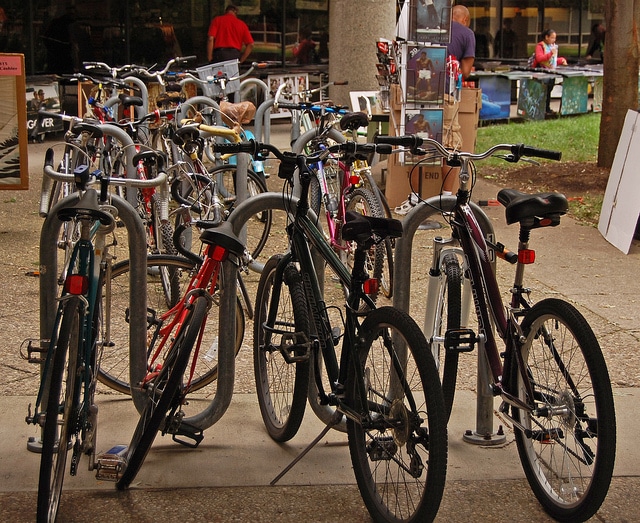By Dalen Barlow:
The University of Louisville has more students than ever that currently bike to campus, but it has led to a decrease in the availability of bike racks on campus.
The university installed new bike racks on the Health Sciences Campus and the Shelby Campus four years ago. In 2011, new racks were added to the Red Barn plaza and the SAC west entrance. Later, in the spring of 2012, three new large racks were installed at the north entrance of Louisville Hall and one covered rack at the west entrance of Threlkeld Hall.
Justin Mog, assistant to the provost for sustainability initiatives, said in August 2012, the Sustainability Council installed 66 new bike racks at various spot throughout the Belknap campus, providing 432 spots. Mog also acknowledged that the university is aware of the problem, but there just aren’t the necessary funds available to complete such a project.
“A good bike rack costs us about $1,000, but the installation is what raises the price to almost double. If we had the money, I would have no problem putting up more bike racks around campus.”
Mog bikes to campus every day and said he does notice the problem.
Another issue is the Earn-A-Bike program at the university. The program provides 1,200, $400 vouchers every year for people who agree not to drive to campus for two years. This works on a non- first-come-first-serve basis. This project, along with other improvements to the campus, is funded through the Climate Action Plan.
This year, hundreds of applicants had to be turned away. Mog said the Sustainability Council’s budget is only $183,000 per year.
“Students have a lot of power within the university,” said Mog. “If enough students were to approach the SGA with this problem, it’s possible they would produce the funding needed for such a project. It has been discussed that we bring in advertisers to build covered bike racks, but that is still just an idea. Covered parking, which we don’t have a lot of, would save a lot of bikes that are left out in the winter, and then when you need them in the spring, they’re ruined.”
“Maybe if students were part of a privately funded department, they could propose the problem to them. I still think the best thing to do would go to the SGA and bring the problem to their attention.”
Monali Haldankar, the SGA student body president, said, “With anything which requires funding, we are more than happy to do so if we were able to do the research or obtain the research to make sure the problem exists and there wasn’t another creative avenue of solving the specific funding problem.”




